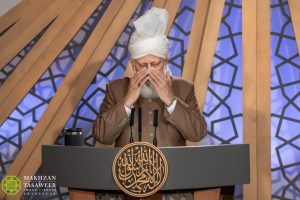
On April 1, 1907, the Promised Messiah (as) went out for a morning stroll accompanied by his companions.
Along the way, he addressed Hazrat Mufti Muhammad Sadiq Sahib (ra), editor of Al-Badr newspaper, and said:
“Publish this in the newspaper and inform everyone; these days are the days of God Almighty’s wrath. Allah Almighty has revealed to me on many occasions
غَضِبْتُ غَضَبًا شَدِیْدًا
]‘I have been greatly angered’[
These days, the plague continues to spread, and a fire is blazing in every direction. I am profusely praying to God Almighty for my Jama`at [community], that He may keep it safe. However, it is proven through the Holy Qur’an that whenever Divine wrath descends, the righteous are also taken into its fold along with the wicked. As such, people shall be judged according to their own individual deeds. The flood of Noah (as) affected everyone, whereas there were men, women and children who were oblivious of Noah’s (as) claim and its proofs. The victories which took place in war (Jihad) were all signs for the truthfulness of Islam, yet in each one, Muslims were also killed along with the disbelievers; the disbelievers went to hell and the Muslims became martyrs. Similarly, the outbreak of the plague serves as a sign for my truthfulness, and it is possible that some members of our Jama`at may also be martyred as a result. I am praying that God Almighty maintains a distinction between them and others, but members of the Jama`at should remember that simply extending one’s hand [to pledge allegiance] is meaningless until our teachings are acted upon.
Thus, first and foremost, observe the rights of God. Cleanse your souls of its inner passions. Then, fulfil the rights of God’s creation and perform righteous deeds. Establish true faith in God and continue to pray with humility in the presence of God Almighty; let not a day go by without having wept in prayer before God. Alongside this, adopt all precautionary measures through the practical means and resources that are available. Abandon such homes wherein mice begin to die, and leave areas that have been affected by the plague, setting up camp in an open field.
Show utmost sympathy and compassion to those individuals and their families who, by Divine Fate, are inflicted with the plague, and leave no stone unturned in finding a cure or treatment for them. But remember, being supportive does not mean breathing in their contagious air or being affected by their clothes. In fact, beware of these affects; keep them in an open area. And one who, God forbid, dies from this disease, is a martyr, they need not be bathed nor do they require a new shroud. Let their clothes remain and if possible, place a white sheet over them. And because disease spreads more in a corpse after death, people should not gather around it. As needed, two or three men should carry the charpai [a tradtional woven bed] while all others gather at a distance, a hundred feet away for example, and offer the funeral from there. The funeral is a prayer and it does not necessitate one to be standing right by the corpse. Where the graveyard may be far, for example in Lahore, then if such means are available, the corpse should be loaded into a vehicle or onto a cart to be taken. And do not lament over the corpse; objecting to the Will of God is a sin.
Do not fear that others will speak ill of you owing to this practice; since when have they ever spoken in your favor? This is all according to the Shari`ah.You will see that those who mock you will eventually follow you themselves in these matters.
Once again, it must be emphasized that that any home which is small and dark, wherein air and light cannot sufficiently enter, you must leave it immediately, for such a home itself is dangerous, even if a mouse has not died in it. Stay on the roofs of your houses as much as possible. Avoid the lower levels, and keep your clothes clean. Have the open drains frequently cleaned. Most of all, purify your hearts as well, and reconcile [your relationship] with God.
(Malfuzat, Vol. 5, pp. 194-195, 1988 Edition)




Add Comment